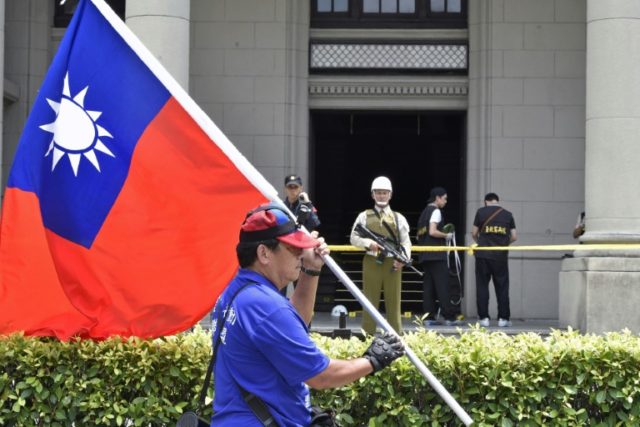China’s displeasure at the notion of U.S. Marines guarding the American diplomatic mission in Taiwan reached fever pitch on Tuesday, as China’s state-run Global Times denounced the security detail tantamount as an “invasion of the U.S. military of Chinese soil.”
The United States does not have a formal embassy in Taiwan, but a facility known as the American Institute in Taiwan (AIT) serves that purpose in effect. China is extremely sensitive to any measures that treat Taiwan as an independent nation, including steps that would make the AIT look like a real foreign embassy instead of a “de facto” consulate.
The U.S. State Department requested a Marine Security Guard detachment for the AIT before the Fourth of July holiday this year, prompting immediate Chinese warnings to “exercise caution” and “avoid affecting overall bilateral ties.”
Beijing stressed the importance of respecting the “One China” policy, which states that Taiwan is largely autonomous but remains an inseparable part of China. In practice, One China means Taiwan must avoid declaring complete independence and preserve the possibility of peaceful reunification at some future date–and other countries must refrain from helping Taiwan become fully independent.
The American Institute in Taiwan recently completed a $250 million expansion and increased its staff to about 450 people, so enhanced security seemed a reasonable request. The State Department kept its deliberations quiet and generally refused to discuss the details with reporters to avoid provoking China.
The Taipei Times reported on Sunday that Marine security guards are on the way to protect the new AIT complex when it commences operations in September. A similar report made the front page of the Chinese-language Liberty Times of Taiwan.
There was little official confirmation for the Taipei Times report, which relied on “sources familiar with the matter” who said the Marines “could be considered a representation of how much the U.S. values its relationship with Taiwan.” The possibility of bringing Taiwanese military police to facilities in the United States as a reciprocal gesture of cooperation was also mentioned by these sources.
The Chinese Communist Party’s Global Times wrote a furious editorial warning Taiwanese “pro-independence activists” not to portray the hypothetical Marine detachment as proof that Taiwan is an “independent sovereign country.”
“The separatist forces in Taiwan have suffered from multiple strikes from the Chinese mainland recently. They are hoping to lift the morale of their camp through hyping topics related to the AIT,” the Global Times editorialists muttered.
By “strikes” they meant “setbacks” such as several countries rescinding diplomatic recognition for Taiwan under intense pressure from Beijing. China has not launched military strikes against Taiwan yet, although Beijing has a fondness for intimidating military exercises and provocative violations of Taiwan’s airspace.
Some of China’s “strikes” against Taiwan are remarkably petty but have psychological value as demonstrations of Chinese economic influence, such as China successfully bullying foreign airlines into changing the way their websites refer to Taiwan. That was most likely the great victory the Global Times had in mind when it crowed about the flagging morale of Taiwanese independence activists.
The Global Times editorial was very concerned about what the Marines prospectively sent to guard the AIT would be wearing. Several times during the piece, it is made clear that Marine uniforms bother Beijing more than the Marines inside them (emphasis added):
If the US Marines publicly station at the AIT in their uniforms, that would be treated by Beijing as a severe subversion of the one-China policy or even an invasion of the US military of Chinese soil. The AIT would also be regarded as a primary stronghold for the US invasion of China. Taiwan leader Tsai Ing-wen’s administration would be defined as a traitorous group.
That being said, from a strategic perspective, the AIT would become the most insecure place in Taiwan and a blasting fuse for clashes.
The AIT has never been a real non-governmental institution. Many US people who stationed there are diplomats, intelligence staff, military officers and experts. The new AIT complex is larger and will play a more important role in a tough China strategy by the US. But there is still a difference between offending openly and not doing so.
The status of Taiwan and posture of China-US relations are not shaped by a few petty tricks.
This lecture about petty tricks comes from a Communist Chinese newspaper that puts the name of every Taiwanese government agency in quotation marks, such as the “Ministry of National Defense,” to imply they are all just make-believe ministries on an island that only pretends to be an independent state.
The American Institute in Taiwan sought to downplay controversy over the weekend by insisting that no major changes or provocative displays are planned for the new facility.
“As is the practice at AIT’s current location, a small number of American personnel detailed to AIT, along with a larger number of locally hired employees, will provide security for the new office building, in cooperation with local authorities,” an AIT spokeswoman said.
Taiwan News noted on Tuesday that this statement could be interpreted to mean U.S. military personnel in plain clothes have been protecting AIT facilities all along, which would displease Beijing but avoids the public display of sovereign respect that would enrage it.
Taiwan’s Ministry of Foreign Affairs also downplayed the suggestion that Taiwanese military police would be sent to America in a reciprocal gesture for the arrival of U.S. Marines at AIT, pointing out that Taiwan’s use of military police at facilities in the U.S. have nothing to do with symbolic reciprocal gestures. The MOFA noted Taiwan has employed private security personnel at its facilities in the U.S. since 2004.

COMMENTS
Please let us know if you're having issues with commenting.